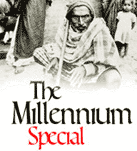The director on ten memorable scenes from Indian films
I feel a scene need not be cinematically excellent to appeal to you. It can be very direct and yet attract you. A man coming out of a house and kicking a puppy may appear very direct, but it can send shivers down your spine. I feel there are a lot of such very emotional scenes in Indian cinema and our films rely heavily on such scenes. I am selecting a few scenes where the relationships are quite unique and thus very appealing to me. These scenes may not necessarily be the best scenes according to many. But I like those scenes, which make you think even after you leave the theatre.
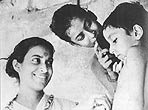 One of the scenes, which still remains in my mind, and I can never forget even though I saw the film long ago, is a scene from Satyajit Ray's Pather Panchali. It is a scene where the children go to see the train. They run towards the railway track with the sound of the engine in the background, and it starts raining. Instead of going to see the train, the girl stops and dances in the rain. Ultimately, only the boy gets to see the train passing by. Later on you remember that on seeing dark clouds in the sky, the boy had taken an umbrella. You may also remember that the girl falls ill and dies. It is one of my memorable scenes.
One of the scenes, which still remains in my mind, and I can never forget even though I saw the film long ago, is a scene from Satyajit Ray's Pather Panchali. It is a scene where the children go to see the train. They run towards the railway track with the sound of the engine in the background, and it starts raining. Instead of going to see the train, the girl stops and dances in the rain. Ultimately, only the boy gets to see the train passing by. Later on you remember that on seeing dark clouds in the sky, the boy had taken an umbrella. You may also remember that the girl falls ill and dies. It is one of my memorable scenes.
I like a very simple scene in Adoor Gopalakrishnan's Kodiyettam. Gopi, a simpleton, an idiot in the film goes out with his wife. He is wearing a neat clean mundu and shirt and both of them are carrying umbrellas. The previous day's rain has left lots of puddles on the road and as they walk, avoiding the puddles, a car passes by and splashes water all over him and his clean clothes. Everyone expects him to get angry and shout at the driver. Instead, he looks at the car with wonder and admiration and says: "What speed!" Oh! that one scene speaks volumes about the character.
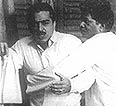 Then, I would say the climax in Mani Ratnam's Nayakan. As the police take Kamal Haasan away, his little grandson asks him, "Are you a good person or a bad person?" The lost and crushed Kamal Haasan has no answer to that innocent question. It was a very poignant scene.
Then, I would say the climax in Mani Ratnam's Nayakan. As the police take Kamal Haasan away, his little grandson asks him, "Are you a good person or a bad person?" The lost and crushed Kamal Haasan has no answer to that innocent question. It was a very poignant scene.
 Whenever I hear someone play a mouth organ, I am reminded of the scene in Ramesh Sippy's Sholay. Do you remember the scene in night when Amitabh Bachchan is playing a mouth organ and Jaya Bhaduri silently comes out to put off the light? It has always touched me. In that scene, no words are exchanged, but everything is said. All the scenes between those two are very subtle and silent but very emotionally charged. I like the understatement, I like the controlled performances and I enjoy watching those scenes again and again.
Whenever I hear someone play a mouth organ, I am reminded of the scene in Ramesh Sippy's Sholay. Do you remember the scene in night when Amitabh Bachchan is playing a mouth organ and Jaya Bhaduri silently comes out to put off the light? It has always touched me. In that scene, no words are exchanged, but everything is said. All the scenes between those two are very subtle and silent but very emotionally charged. I like the understatement, I like the controlled performances and I enjoy watching those scenes again and again.
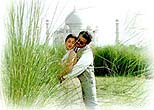 Among the films that I have shot myself, I like one scene in Iruvar a lot. Mohanlal enters an empty studio, sits on a chair and dreams of becoming a great actor. I feel this one particular scene will touch every human being as all of us, at some point or the other, dream of something. The scene, I feel, depicts the dreams of every human being. Everyone has a dream and this scene will stimulate the dreams of all of us. The strength of the scene is that he has a beard, which he has pasted on his face as he was acting as a policeman, a very small, insignificant role in the film. So, the beard conceals his true emotions too. I feel it is one of the most powerful scenes I have seen.
Among the films that I have shot myself, I like one scene in Iruvar a lot. Mohanlal enters an empty studio, sits on a chair and dreams of becoming a great actor. I feel this one particular scene will touch every human being as all of us, at some point or the other, dream of something. The scene, I feel, depicts the dreams of every human being. Everyone has a dream and this scene will stimulate the dreams of all of us. The strength of the scene is that he has a beard, which he has pasted on his face as he was acting as a policeman, a very small, insignificant role in the film. So, the beard conceals his true emotions too. I feel it is one of the most powerful scenes I have seen.
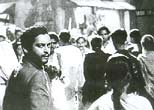 I like the scene in Guru Dutt's Pyaasa where he comes in front of everyone in the auditorium and says he is not dead. Till then all were under the impression that he was dead. It is one of my favourite scenes and whenever I see the film, I look forward to seeing that particular scene.
I like the scene in Guru Dutt's Pyaasa where he comes in front of everyone in the auditorium and says he is not dead. Till then all were under the impression that he was dead. It is one of my favourite scenes and whenever I see the film, I look forward to seeing that particular scene.
One of the most mesmerising and convincing scenes in Indian cinema itself is the scene in Satyajit Ray's Apur Sansar where he slaps his brother for talking badly to his wife.
 Another very forceful scene, which nobody can forget, is the last scene in Shyam Benegal's Ankur where a little boy picks up a stone and throws it at the car. His anger, his disapproval, his protest, his courage; all such strong emotions are present in the scene and the impact is tremendous.
Another very forceful scene, which nobody can forget, is the last scene in Shyam Benegal's Ankur where a little boy picks up a stone and throws it at the car. His anger, his disapproval, his protest, his courage; all such strong emotions are present in the scene and the impact is tremendous.
 There is a scene in Satyajit Ray's Charulata when she sits down and decides to write her own story. She wants to write just to prove her worth to someone else and also to prove someone else wrong. Everyone, every individual has a story to write and tell others. Here, she starts writing to prove herself but as her story proceeds, she rediscovers herself, recollects her memories of childhood, her village and begins to see herself in a different light. It is an experience.
There is a scene in Satyajit Ray's Charulata when she sits down and decides to write her own story. She wants to write just to prove her worth to someone else and also to prove someone else wrong. Everyone, every individual has a story to write and tell others. Here, she starts writing to prove herself but as her story proceeds, she rediscovers herself, recollects her memories of childhood, her village and begins to see herself in a different light. It is an experience.
The story of Tapan Sinha's Aadmi aur Aurat has themes like national integration and religious harmony in it, but the beauty of the film is that those things are never stated directly. The film does not preach this but the understatement is so powerful that it moves you immensely. In the last scene, she tells the man, "Let Allah bless you". With that one line, the whole story changes. It is the story of a man who actually wants to seduce a girl but finds out that she is pregnant. Instead of seducing her, he helps her get admitted in a hospital where she gives birth to a baby boy. It is only when she blesses him, it dawns on him that she is a Muslim! Till then, they were just a man and a woman; an aadmi and aurat. It was a beautiful scene.
The director-cinematographer (Halo, The Terrorist, Malli) spoke to Shobha Warrier
Tell us what you think of this list?
